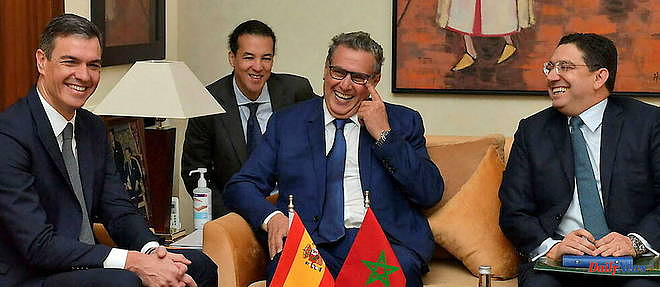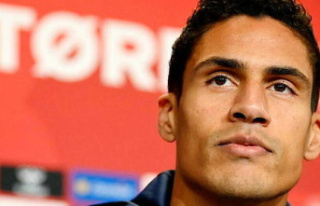After years of rocky relations, and a deep diplomatic crisis, Spain and Morocco decided to consolidate their "strategic partnership" in several areas, this Thursday, February 2 in Rabat. Sign of the importance of this meeting, the first of this magnitude since 2015, the Prime Minister, Pedro Sanchez, arrived the day before, accompanied by a dozen ministers, despite criticism in Madrid against too many concessions of the leader of the government. The objective is to boost economic and commercial exchanges between the two countries, but also to improve their diplomatic relations, which have been complicated in recent years by the question of Western Sahara and migratory pressures.
On the program, first, the signing of some twenty agreements intended to facilitate Spanish investment in Morocco - Spain is the third largest foreign investor there. According to Madrid and Rabat, the decision to renew more peaceful relations is already producing the first results. The bilateral volume of trade, for example, increased by 31%, making Morocco Spain's main trading partner outside the EU after the United Kingdom and the United States, the Spanish minister said. of Foreign Affairs, José Manuel Albares, in a statement to the Iberian press.
To go further, the two countries have forged partnerships in various sectors, such as agriculture, rail transport, tourism, education and culture. It is also planned to intensify the development of new projects in renewable energies, or water desalination. To this end, a new financial protocol has been approved which will double - to 800 million euros - aid from the Spanish government for projects in Morocco, a country described as a "gateway to Africa".
Also on the menu, illegal immigration and the fight against terrorism. Madrid highlighted the drop of more than 25% in illegal immigration in 2022 thanks to its police cooperation with Rabat, with 31,219 migrants entering Spain illegally in 2022.
The two parties will also initial an agreement to "totally normalize the passage of people and goods" across sea and land borders. The opening of land crossings concerns the Spanish enclaves of Melilla (whose customs post has been closed since 2018) and Ceuta, in northern Morocco.
This cooperation, welcomed by Rabat, was however tarnished by the death of at least 23 Sudanese migrants who had tried last June to enter the enclave of Melilla via the Moroccan border town of Nador.
Interior Minister Fernando Grande-Marlaska will plead with his Moroccan counterpart, Abdelouafi Laftit, to reactivate deportation routes for irregular migrants and return to pre-Covid-19 levels, source says from the Spanish ministry.
Rabat is finally considered a key partner in the fight against terrorism. An important subject for Madrid after an attack at the end of January attributed to a young Moroccan in an irregular situation against two churches in Algeciras (South) in which a sexton was killed.
"The better the relations between Morocco and Spain, the better it is for Spain, the better it is for Morocco, the better it is for Europe, the better it is for business and for people. citizens of both countries,” Pedro Sanchez pleaded as he closed an economic forum in Rabat on Wednesday.
It was the head of the Spanish government himself who ended a year of diplomatic quarrel with Morocco last March by agreeing to support Moroccan positions on Western Sahara. The crisis erupted in April 2021 after the hospitalization in Spain - under a false identity, according to Rabat - of the leader of the Sahrawi separatists of the Polisario Front, Brahim Ghali, sworn enemy of Rabat.
But the Rabat-Madrid honeymoon comes as France – another historical partner of Rabat – is pilloried by Moroccan politicians and media who accuse it of having "orchestrated" a European Parliament resolution worrying freedom of the press in Morocco and allegations of corruption of MEPs in Brussels. Spanish Socialist MEPs voted against this text. "Honeymoon between Rabat and Madrid, cold crisis with Paris", notes the Franco-Moroccan journalist Mustapha Tossa on the Moroccan site Atlasinfo.
This idyll is not to everyone's taste in Spain. Yolanda Diaz, number three on the executive and Minister of Labor representing Podemos, did not wish to be on the trip as the radical left formation is opposed to Mr. Sanchez's "unilateral" turn on Western Sahara. A turnaround applauded in Rabat.
On the right, the Popular Party, the main opposition force, estimated through the voice of MEP Gonzales Pons that "there is no greater humiliation than to give in to everything in the face of Morocco". And the fact that Mr. Sanchez was not received in person by Mohammed VI is seen as a snub by the opposition and the Spanish press. However, a few hours before his arrival, the Socialist Prime Minister had a telephone conversation with the Cherifian sovereign, who invited him to return "very soon" to Morocco for an official visit, this time, "with a view to strengthening this positive momentum in the excellent bilateral strategic partnership,” according to the royal cabinet.












